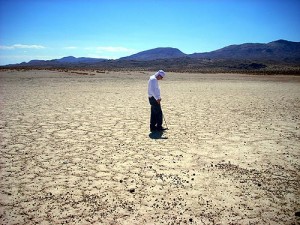Where To Find Meteorites
The best place to look for and findMeteorite not seen to fall, but recovered at some later date. For example, many finds from Antarctica fell 10,000 to 700,000 years ago. Click on Term to Read More meteorites are in arid climates, deserts are a perfect environment for meteorites.
Meteorites contain iron (chondritesChondrites are the most common meteorites accounting for ~84% of falls. Chondrites are comprised mostly of Fe- and Mg-bearing silicate minerals (found in both chondrules and fine grained matrix), reduced Fe/Ni metal (found in various states like large blebs, small grains and/or even chondrule rims), and various refractory inclusions (such Click on Term to Read More) and some (about 5%) are iron, hence iron meteoriteIron meteorites consist mostly of metallic iron alloyed with typically between ~5 to ~30 wt% nickel. The main metal phases are kamacite α-(Fe, Ni) and taenite y-(Fe, Ni). Based on their group classification, they may also contain a small weight percentage of one or more of the following minerals: • Click on Term to Read More. Most people when they are introduced to meteorites think of iron meteorites because they “look” more like people think they should look. Take the Sikhote Alin meteoriteWork in progress. A solid natural object reaching a planet’s surface from interplanetary space. Solid portion of a meteoroid that survives its fall to Earth, or some other body. Meteorites are classified as stony meteorites, iron meteorites, and stony-iron meteorites. These groups are further divided according to their mineralogy and Click on Term to Read More that fell in Russia in 1947. This iron meteorite is a perfect example of what a meteorite should look and they are highly sought after by meteorite collectors all over the world for their aesthetic value.
MetalElement that readily forms cations and has metallic bonds; sometimes said to be similar to a cation in a cloud of electrons. The metals are one of the three groups of elements as distinguished by their ionization and bonding properties, along with the metalloids and nonmetals. A diagonal line drawn Click on Term to Read More detectors are used to find meteorites below the surface, but a magnet stick/cane (basically a gold club shaft or walking stick with a strong rare earth neodymium magnet attached) will work very well. Metal detectors don’t work very well on dry lake beds because of the high mineralization of the ground, this produces lots of noise and false signals.
Dry lakes beds in the deserts of the southwest are great places for beginner meteorite hunters to start looking. They are easy to navigate, no brush or trees, boulders or washes to worry about. Just a nice smooth surface to walk across. The other nice thing about hunting dry lake beds is the light color of the ground. This contrasts nicely with the dark color of meteorites and makes finding them visually relatively easy. The hard part is patience. Meteorites are rarer than gold, and it take a trained eye to find them effectively and consistently.
Try hunting along the shoreline of the dry lake. Hunting the center is good too, and you might find one there, but you’re more likely to find meteorites along the shoreline because over time meteorites migrate down from the hills from rains and erosionRemoval of weathered rocks by moving water, wind, or ice. Click on Term to Read More through washes. Wind or floods will cause some meteorites to move to the center of the lake bed, and new fresh falls could be located there as well.
If you do use a detectorAny device used to sense the passage of a particle or photon (x-ray, γ-ray, etc.). X-rays can be detected using sealed-gas proportional, gas-flow proportional detectors, and Li-drifted Si semiconductor detectors. A Li-drifted Ge detector is used to count γ-rays in the laboratory. Click on Term to Read More, use it around the outer edges of the lake bed. The bushes and boulders will sometimes catch meteorites, and old gold prospectors may have thrown a meteorite in the bushes because they thought it was a hot rock. Many meteorites have been found by hunters laying atop old dig holes left by gold hunters not knowing what it was, perhaps mistaking the meteorite for a hot rock.
Another great place to hunt for meteorites is just about anywhere. I know that’s vague but think of it this way. Meteorites have been falling and striking the Earth for millions of years. Over time there have been literally billions of meteorites that have impacted the surface. Some big, some small. Keeping this in mind, realize that 70% of the Earth’s surface is covered in water. This means that 70% of all meteorites that have ever impacted our planetThe term "planet" originally comes from the Greek word for "wanderer" since these objects were seen to move in the sky independently from the background of fixed stars that moved together through the seasons. The IAU last defined the term planet in 2006, however the new definition has remained controversial. Click on Term to Read More have gone right into our beautiful blue oceans. ;) Kinda sucks, but I guess that’s just the way it goes.
Now I know that if some of my meteorite friends read this post they’ll be razzing me that I said you can find meteorites anywhere. This is true, however, meteorites deteriorate over time. How long it takes is arguable… MeteorHow long Sonic booms Of the several 10s of tons of cosmic material entering Earth's atmosphere each day, only about one ton reaches the surface. An object's chance of survival depends on its initial mass, speed and angle of entry, and friability (tendency to break up). Micrometeoroids radiate heat so Click on Term to Read More CraterBowl-like depression ("crater" means "cup" in Latin) on the surface of a planet, moon, or asteroid. Craters range in size from a few centimeters to over 1,000 km across, and are mostly caused by impact or by volcanic activity, though some are due to cryovolcanism. Click on Term to Read More in Arizona for example had an impact some 50,000 years ago from an iron meteorite weighing around 300,000 tons and measured some 150 feet across. The impact created a crater almost a mile wide, 570 feet deep and pushed up the earth around the crater more than 150 feet from the surrounding plains. It also scattered fragments of meteorite covering and area 8-10 miles in diameter across the desert floor.
The pieces from this meteorite are still very much intact and well preserved and will still probably be here for hundreds of thousands of years more. Unless it floods.

See, meteorites are very susceptible to their environment, if an iron meteorite falls in the ocean you can imagine it would rust away completely in a relatively short amount of time. If a chondriteChondrites are the most common meteorites accounting for ~84% of falls. Chondrites are comprised mostly of Fe- and Mg-bearing silicate minerals (found in both chondrules and fine grained matrix), reduced Fe/Ni metal (found in various states like large blebs, small grains and/or even chondrule rims), and various refractory inclusions (such Click on Term to Read More (stone meteorite) falls in the ocean, the iron in it breaks down and corrodes the meteorite very quickly. It will crumble into nothing in a very short period of time. This is why more meteorites are found in dry arid regions across our planet than any other areas. Water, humidity, and wind erosion contribute greatly to a meteorite’s demise.
Meteorites have been found everywhere on this planet, Antarctica, Africa, North and South America, Russia, China, Europe and Australia. In fact Australia is a great place to hunt for meteorites.
Meteorites are in fact everywhere. Swamps wouldn’t be a good place to look, but anywhere that is relatively dry, with old ground is a great place to hunt. Especially if people have never hunted meteorites there before. Gold producing areas (that are legal to hunt on) are good places to look because people have already been out there with detectors hunting gold. When you find a hot rock, what do you do with it, toss it in a bush right? Check the bushes! They are great places to find meteorites.
Hunting meteorites is one thing, finding them is quite another story. I’ll leave that for my next article.
This post is based, in part, on content licensed from E. Wichman from the defunct website www.meteoritesUSA.com that was purchased by SkyFall Meteorites.






